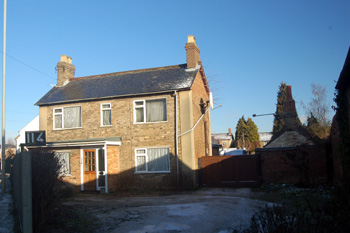The Swan Beerhouse Girtford

114 London Road - the former Swan Beerhouse - December 2010
The Swan Beerhouse: 114 London Road, Girtford
Bedfordshire and Luton Archives and Records Service has one stray reference to a Swan Inn at Girtford before the creation of the later Swan Beerhouse. This was in 1800 when a cottage which had formerly been the Swan, but was then divided into three dwellings together with a close of three acres was in the ownership of Thomas Croot of Girtford [LS268]. There is no indication from the document where the inn stood but it was, presumably, somewhere on the Great North Road.
The history of the Swan Beerhouse begins in 1849 when a piece of land in Girtford belonging to the late Henry Jeeves was sold at auction for £63 to Sandy builder Henry Usher [GK146/2]. The land was described as fronting west on the Great North Road, with a frontage of 66 feet, north on a property lately occupied as two dwelling houses, east on the back road to Sandy with a frontage of 58 feet (now Saint Neots Road) and south on a plot of land forming another part of Henry Jeeves’ estate.
In 1853 Usher conveyed a house at Girtford, which he had presumably built, to its occupier William Patrick, market gardener for £260 [GK146/3]. The frontage to the Great North Road was still 66 feet and the site was now 134 deep (i..e. leading east) on the north side and 136 feet deep on the south. The countywide register of alehouse licences of 1876 states that the Swan was first licensed in 1857 and a year later Patrick took out a mortgage with the Second East Bedfordshire Building Society for £253/2/6, no doubt to help pay for purchase of the property and the costs of setting up business as a beerhouse [GK146/4]. The mortgage was repaid in 1867.
In 1863 Henry Patrick agreed to sell a brick built property with barns, stables, outbuildings and garden ground in his own occupation to Baldock [Hertfordshire] brewer Oliver Steed for £35, Steed being responsible for Patrick’s debts, the result of further loans in 1858, 1860 and 1861 to the tune of £277 [GK146/11]. For whatever reason a conveyance was not enacted until 1889 when Patrick conveyed the Swan to Steed’s widow Margaret and her trustee. The southern border now extended to 183 feet otherwise the measurements were as in 1853 [GK146/12].
Shortly after this Steed’s firm was purchased by Charles Morley for William Pickering of Burton-on-Trent [Staffordshire], the Baldock firm becoming known as Morley & Company. The Swan, however, must have been sold as by the early 1890s it is shown in the ownership of Bedford brewers Newland and Nash. The countywide register of alehouse licences of 1903 reveals that the nearest licensed house was 34 yards away (the Dun Cow), that the state of repair of the Swan was good and that it had one front and one back door.
The Rating and Valuation Act 1925 specified that every building and piece of land in the country was to be assessed to determine its rateable value. The valuer visiting the Swan [DV1/C28/128] found it owned by Wells and Winch and occupied by Charles Chesher, who paid rent of £10 per annum, which had been set in 1927. Wells and Winch had purchased Newland and Nash in 1924
The brick and slate and brick and tile detached premises comprised a bar, a tap room, a living room, a kitchen, a larder and a “small room” downstairs with two bedrooms above. Outside lay timber and tiled barns, old timber and tiled two stalled stables, two sheds, a washhouse, a private w. c. and a public w. c. and urinal.
Trade was “not barrel per week” of beer. The valuer commented: “Just taking over” and “Small boot repairing business carried on”. This is the last record to mention the Swan. Chesher is not mentioned in the next Kelly’s Directory for Bedfordshire, that of 1928 and all the only beer seller who is not known to have had a license elsewhere in the next edition, 1931, is Edward Cannell. He does not appear in the next Kelly’s for the county, that of 1936 nor does anyone who is not known to have had a license elsewhere. This suggests that Cannell may have taken over from Chesher, perhaps with others in between but that the beerhouse closed between 1931 and 1936
References:
- LS268: bond for quiet enjoyment of the former Swan Inn: 1800;
- GK146/2: conveyance of a piece of land in Girtford: 1849;
- GK146/3: conveyance of a cottage: 1853;
- GK146/4: mortgage: 1858;
- GK146/11: agreement for sale: 1863;
- HF143/1: Register of Alehouse Licences - Biggleswade Petty Sessional Division: 1872-1873;
- HF143/2: Register of Alehouse Licences - Biggleswade Petty Sessional Division: 1874-1877;
- HF143/3: Register of Alehouse Licences - Biggleswade Petty Sessional Division: 1878-1881;
- HF143/4: Register of Alehouse Licences - Biggleswade Petty Sessional Division: 1882-1890;
- GK146/12: conveyance: 1889;
- HF143/5: Register of Alehouse Licences - Biggleswade Petty Sessional Division: 1891-1900;
- GK31/1: 1897;
- HF143/6: Register of Alehouse Licences - Biggleswade Petty Sessional Division: 1900-1914;
- PSBW8/1: Register of Alehouse Licences - Biggleswade Petty Sessional Division: 1903-1915.
List of Licensees: note that this is not a complete list. Italics indicate licensees whose beginning and/or end dates are not known:
1857-1863: William Patrick;
1869-1879: Thomas Pinner;
1879-1901: Sarah Pinner;
1901-1910: John Ibbott;
1910-1927: Ernest John Ibbott;
1927: Charles Chesher
1931: Edward Cannell?
Beerhouse closed between 1931 to 1936.